To socialize a Maine Coon Kitten, start with daily handling and calm play sessions to build trust. Gradually expose your kitten to new experiences like pets, people, grooming, and car rides using treats and praise for reassurance so they grow into confident, affectionate adults. Keep interactions short and positive, never forced, as Maine Coons respond best to patience, routine, and encouragement.
In this guide on how to socialize a Maine Coon kitten, I’ll walk you through practical, loving ways to help your Maine Coon kitten feel at ease in every situation, from playdates and grooming sessions to meeting strangers and visiting the vet.
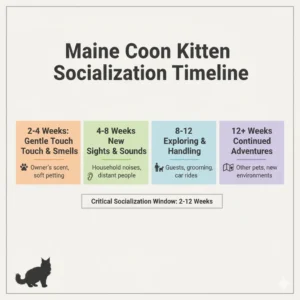
The Ideal Socialization Window
The sweet spot for socializing your Maine Coon kitten is roughly between 2 and 12 weeks of age when their little brains are soaking up the world like sponges. During this window, kittens are most open to learning what’s safe and what’s scary. That’s why breeders play such an important role in early handling gentle human contact, exposure to light household sounds, and even different surfaces (carpet, wood, tile) all set the foundation for confidence.
If you bring your kitten home around 8–10 weeks, your job is to keep that positive learning going. Start small let them explore one room at a time. Introduce family members one by one, always letting your kitten come forward on their own terms. Avoid sudden noise blasts or rough handling during these early days; it can make them wary instead of curious.
By around 3 months, you’ll start noticing clear signs of progress: tail held high, exploring freely, purring during petting sessions, and showing interest in play. Those are your green lights signs your Maine Coon feels safe in their new world.
If your kitten is past the 12-week mark, don’t worry, older kittens can still be socialized. You’ll just need a bit more patience and consistency. Think of it like teaching an older child a new language, slower progress, but with gentle encouragement, they absolutely get there.
You might like: Maine Coon Grooming Guide
How to Socialize a Maine Coon Kitten Step-by-Step
If you’ve just brought home your Maine Coon kitten, you’re not just raising a pet, you’re nurturing a little personality that will grow and evolve with you. Socialization is all about shaping their comfort with the world, one small moment at a time.
Below is a gentle, practical guide for you to know how to socialize a Maine Coon kitten effectively, and these fit right into your daily routine, no pressure, no rushing, just steady progress toward a confident, curious Maine Coon.
1. Gentle Daily Handling
Start by picking up your kitten for short, calm moments each day. Stroke their back, touch their paws, and softly pet around their ears and tail. This helps them learn that human contact is safe and comforting.
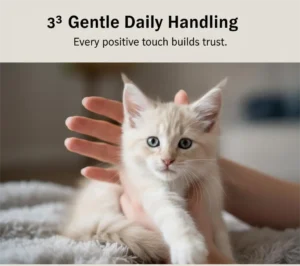
When I first started this with my own kitten, Ruby, she’d wiggle like she’d just been caught mid-adventure. But over time, those wiggly seconds turned into long, happy purr sessions. The secret is consistency a few calm interactions every day work wonders.
You can also introduce other household members slowly. Let your kitten approach first crouch down, speak softly, and allow them to sniff before attempting to pet. Every positive touch builds trust.
2. Introducing Everyday Noises
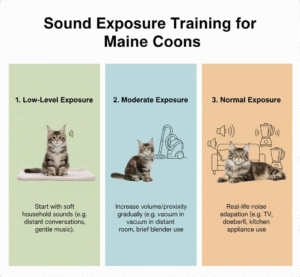
Kittens raised in quiet spaces often get startled by simple sounds later in life vacuums, washing machines, and blenders, the trick is controlled exposure. know this and know peace, “Socialization is one of the most important steps when raising a Maine Coon kitten” so it has to be done right and done once.
Start small: play a recording of gentle household noises while they’re eating or playing. Gradually increase the volume over time. You can even turn on the vacuum in another room so they hear it without being too close.
My friend Sarah used to keep her Maine Coon, Loki, near her while she blow-dried her hair not too close, but close enough that he got used to the sound. Now, Loki barely twitches during his grooming sessions, which says a lot for a cat that fluffy.
3. Meeting New People Gradually
Maine Coons are famous for their friendly nature, but even they can feel overwhelmed if ten people rush to pet them at once.
When introducing guests, start with just one or two calm visitors. Let them sit quietly while your kitten observes. Offer a treat or toy, kittens associate good things with new faces that way.
If your Maine Coon hides at first, don’t force them out. Leave the room and let them emerge when they’re ready. It’s their way of saying, “I’m not scared just taking notes.”
4. Introducing Other Pets Safely
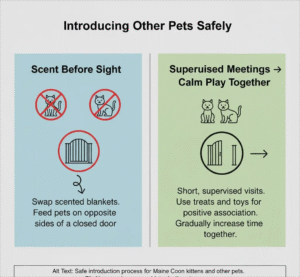
If you already have cats or dogs, introductions need to be gradual. The golden rule: scent before sight.
Swap blankets or toys between your pets so they can smell each other before meeting face-to-face. Then, try short, supervised meetings through a cracked door or baby gate, then reward calm behavior on both sides.
When you do progress to open interaction, keep it brief and positive. A short session where nothing dramatic happens is a success. Repeat it daily, slowly extending the time.
You might like: Maine Coon Feeding Chart
5. Rewarding Calm, Confident Behavior
Every time your kitten approaches a new sound, person, or situation without fear, reward them. A gentle “good kitty,” a chin scratch, or a small treat helps reinforce confidence.
Avoid punishing fearful reactions; it only confuses them. Instead, take a step back, make things quieter, and reintroduce the experience later with more patience.
Cat socialization isn’t a checklist to complete it’s a journey. You’ll know it’s working when your Maine Coon starts trotting up to visitors or curling beside you during noisy moments that once made them jump. That’s the confidence you’ve built together.
Building Confidence Through Play and Routine
Playtime isn’t just about burning energy it’s how Maine Coon kittens learn trust, coordination, and emotional balance. These big-hearted fluffballs are highly intelligent and sensitive, so they thrive in environments that feel both stimulating and predictable.
When I think back to my first months with Leo, my red tabby Maine Coon, I realize that the moments that shaped him most weren’t the “training” sessions, but the spontaneous little games and rituals we shared every day. He learned that I wasn’t just a provider I was part of his world.
1. Interactive Play Builds Trust
Play is one of the fastest ways to bond with a Maine Coon kitten. They’re natural hunters, which means toys that mimic prey feather wands, crinkle tunnels, small bouncing balls bring out their curiosity.
Start with gentle sessions, 10–15 minutes a few times a day. Move the toy slowly at first; let your kitten stalk, chase, and “capture” it. Every successful catch boosts confidence.
My cat Niki was painfully shy when she first arrived she’d hide under the couch and peek out only when she thought I wasn’t watching. But play was her turning point. The first time she darted out to chase a feather wand, I didn’t cheer or move too fast; I just let her “win.” By the end of the week, she was chasing toys across the room like she owned it.
It’s those small victories that turn shy kittens into bold, playful companions.
2. The Comfort of Routine
Maine Coons are adaptable, but they find comfort in patterns. Consistent feeding, play, and sleep schedules give them a sense of control over their environment.
Try keeping morning and evening routines simple and predictable. Feed your kitten around the same time each day, play afterward, and then let them nap in a quiet corner. You’ll notice that once the rhythm sets in, your kitten becomes calmer and more trusting because they know what to expect.
Leo, for example, starts chirping the moment he hears the coffee grinder in the morning. To him, that sound means breakfast and playtime are coming soon. It’s a routine that builds connection and keeps him from “helping” me make coffee by jumping on the counter.
3. Positive Reinforcement Works Wonders
Maine Coons are emotionally intelligent cats they pick up on tone, energy, and even subtle body language. When you reward calm curiosity or bravery with gentle praise, you’re telling your kitten: “This world is safe. You’re doing great.”
Never punish or scold for hesitation or fear. Instead, redirect with play or treats. A kitten who feels understood learns to explore instead of retreat.
And remember, a confident kitten doesn’t just appear overnight they grow into it, one safe experience at a time.
How to Handle Fear or Shyness
Even the most confident Maine Coon kittens can go through shy or fearful phases it’s totally normal. Remember, these are sensitive, observant cats who process the world through their senses. A new sound, a fast hand movement, or even a strong perfume can feel overwhelming to a young kitten still finding their footing.
When Ruby first came home, she spent the first 48 hours wedged behind the couch, peeking out with those wide amber eyes. She’d purr softly if I talked to her but dart away the moment I moved. It wasn’t rejection it was her way of saying, “I want to trust you, but I need a minute.” that is how I gently helped her (and how you can help your own kitten too).
Read the Body Language
Before anything else, learn what your kitten is telling you.
A puffed-up tail, flat ears, or wide pupils signal fear or overstimulation. Slow blinks, soft meows, and relaxed tails mean comfort.
If your kitten is hiding, don’t reach under furniture or try to pull them out. Instead, sit nearby and talk softly. Maybe read out loud or just scroll your phone while staying close. That steady, calm energy lets them know you’re not a threat.
Over time, they’ll start inching closer. The first time Ruby climbed onto my lap on her own, I felt like I’d just earned a diploma in Cat Trust Studies.
What to Do When They Hiss or Hide
If your Maine Coon hisses or runs off, take it as feedback not defiance. It simply means they’re unsure. Step back and give them a safe zone maybe a cozy crate with a blanket that smells like you, or a corner with a soft bed and toys.
Gradually, you can shorten the distance. Toss treats gently near them without forcing eye contact. Every time they come closer on their own, reward the moment. Within days or weeks, most kittens start to associate you with good things: food, warmth, safety.
Reintroduce Triggers Slowly
Say your kitten got spooked by the vacuum cleaner, doorbell, or loud TV. The trick isn’t to avoid the sound forever it’s to reintroduce it at lower intensity. Play the sound softly while your kitten eats or plays. Then slowly increase the volume over time.
This method works like magic for Maine Coons because they’re both intelligent and curious. Once they realize something scary doesn’t actually harm them, their natural curiosity kicks back in.
Ruby now lounges right beside the vacuum when I clean. It took patience, but that transformation — from fear to confidence is the essence of good socialization.
Patience Always Wins
Shyness isn’t something to “fix”; it’s something to guide through understanding. When your kitten realizes you’ll never push too hard, they’ll start to explore more bravely.
Some Maine Coons are bold from day one. Others, like Ruby, bloom quietly, at their own pace. Either way, your job is to make every new experience a little softer and every success a little sweeter.
How to Socialize a Maine Coon Kitten at Home
In a nutshell, socializing a Maine Coon kitten at home is simply about creating small, positive daily experiences that help your kitten feel safe and confident. At this stage, your home becomes the main environment your kitten learns from sounds, scents, people, routines, and gentle handling all play a huge role.
Start with slow introductions to rooms, short play sessions, and letting your kitten explore at their own pace. Pair new experiences with treats and soft praise so your Maine Coon begins to associate new things with comfort, not fear. The video above shows a clear, simple breakdown of what these early steps look like, but remember that every kitten is different. The goal is consistency, patience, and making sure each new moment feels safe and positive for your Maine Coon.
At What Age Should a Maine Coon Be Spayed?
Spaying is an important part of raising a healthy, well-adjusted Maine Coon, and timing plays a big role in how smoothly your kitten handles the change. Most vets recommend spaying anywhere between 4 and 6 months old, but Maine Coons are a slow-maturing breed, which means they grow differently from regular domestic cats.
Because of their larger size and longer development cycle, many breeders and feline specialists prefer spaying Maine Coons a little later usually around 5 to 7 months to give their bones, muscles, and hormones a bit more time to develop.
The good news is that the spaying process is generally straightforward when done at the right age, and it has long-term benefits, including reduced risk of certain health problems, fewer hormonal behaviors like yowling or roaming, and a calmer temperament that makes socialization much easier. A kitten who isn’t dealing with hormone-driven stress is more relaxed, more focused during training, and far more responsive to new experiences.
If you’re unsure about the exact timing, your vet can help you decide based on your kitten’s weight, maturity, and overall health. What matters most is choosing a window that supports both their physical development and the emotional, confidence-building work you’re already doing through socialization.
Why Socialization Matters for Maine Coon Kittens
Socialization isn’t just about helping your Maine Coon kitten “get along” it’s about shaping who they’ll become. Those first few months are when your kitten’s world expands beyond their littermates and breeder’s space. Every new sound, touch, and face adds another thread to their growing sense of security.
Maine Coons are naturally curious but also surprisingly sensitive. They love exploring, climbing, and meeting new people but push them too fast, and they can retreat into nervous habits that are tough to reverse. A well-socialized Maine Coon is more likely to handle life’s curveballs with grace from vet visits to guests dropping by unannounced.
I remember a breeder once telling me, “What a kitten learns before 12 weeks sets the tone for the rest of their life.” That stuck with me. You can almost see the difference kittens raised with gentle daily handling become those confident, affectionate adults who stroll into the room like they own it. On the other hand, those who grow up isolated often struggle with shyness, hiding, or fear-driven scratching when startled.
Socialization doesn’t mean overwhelming your kitten. It’s simply about positive exposure: new sounds, textures, smells, and people all introduced in calm, rewarding ways. Think of it like building emotional muscle: a few small, positive experiences every day help your Maine Coon grow into the bold, loving companion they’re meant to be.
Long-Term Socialization Tips for Growing Maine Coons
The thing about Maine Coons is they don’t just grow bigger; they grow bolder. But that early window of kitten socialization doesn’t slam shut when kittenhood ends. It simply shifts gears. Once your kitten turns 6–8 months, they start to settle into their personality, but how you handle new experiences during this phase will shape how confident (or cautious) they’ll be as adults.
I learned this the fun way with Stings, my most curious of the bunch. As a kitten, he was the explorer—tail high, sniffing every corner of the house. But once he hit a year old, something changed. Loud visitors or car rides started to make him uneasy. I realized I’d gotten so comfortable with his easygoing nature that I stopped introducing new things. His world had become a little too predictable.
So, I made it a point to start small again gentle reintroductions that reminded him the world outside the living room wasn’t so scary after all.
Keep Positive Exposure Going
Your Maine Coon might act like they’ve seen it all by age one, but life will keep surprising them: new furniture, guests, vet visits, even travel.
The best thing you can do is to make these experiences part of normal life rather than sudden, stressful events.
- Let them explore a new box or room every few weeks.
- Invite calm friends over to play gently with them.
- Take them for short car rides, even if it’s just around the block, so the carrier doesn’t equal “vet trip panic.”
Every exposure adds another layer of confidence.
When Ruby started going to the vet without trembling, it wasn’t because she magically became brave. It was because every small, safe adventure told her: “I’ve got this.”
Traveling or Moving with a Maine Coon
Travel can be a big challenge for large cats, but it doesn’t have to be traumatic. Start months ahead by leaving the carrier open at home. Drop treats inside. Let your Maine Coon nap there. Once they’re comfortable, practice short drives with music or windows slightly open for airflow.
If you ever move homes (like when I relocated with Niki), bring familiar items first her blanket, her scratcher, even her old food mat. Cats anchor their sense of safety to scent. Having their things around helps them adjust faster than any amount of coaxing could.
Keep Building Confidence Through Routine
Adult Maine Coons thrive on a rhythm they can count on mealtime, brushing, play, cuddle, repeat. But within that rhythm, sprinkle small changes to keep them adaptable.
Try new toys every few weeks. Rearrange their climbing tree. Switch between playtime in the morning and evening sometimes. These gentle tweaks keep them flexible, curious, and socially “awake.”
Because the truth is, Maine Coons are thinkers. They don’t just react, they process. Give them variety in a safe way, and they’ll stay curious and unafraid even as they grow older.
Socialization Never Really Ends
Think of it less like training, and more like an ongoing conversation with your cat. You’re constantly teaching them that life is full of sounds, smells, and people, but none of it’s dangerous when they have you by their side.
Stings, Ruby, and Niki each grew into such different personalities one bold, one cuddly, one cautious, but all of them share that same sense of calm in new situations. That’s not an accident. It’s years of quiet, consistent reassurance.
So even when your Maine Coon is a majestic, full-grown fluffball who acts like they own the place, keep those “confidence rituals” going: gentle handling, play, and positive new experiences. It keeps their world big and their hearts open.
Mistakes to Avoid When Socializing a Maine Coon Kitten
Let’s be honest most new Maine Coon owners aren’t trying to mess things up. They just love their kitten so much that they either rush the process or handle it like they would a regular domestic shorthair. But Maine Coons play by their own emotional rulebook. Here are some common pitfalls to dodge when helping your kitten become a confident, friendly cat.
1. Forcing Interactions Too Soon
One of the biggest mistakes is trying to rush bonding. Maybe your new kitten just came home, and you’re eager to show her to every family member, friend, and pet you’ve got. But for a Maine Coon, that sudden burst of attention can feel overwhelming.
Instead, give her time to explore her new environment on her own terms. Let her come to you not the other way around. Those first few days are about building trust, not forcing affection.
2. Punishing Fearful Behavior
If your kitten hisses, hides, or runs off, it doesn’t mean she’s being “bad.” She’s just scared and how you respond in that moment can shape her long-term trust in you. Never scold or chase her out of hiding. Instead, lower your energy. Sit quietly nearby, speak softly, maybe offer a treat without eye contact. You’re teaching her that she’s safe even when she’s nervous.
3. Overstimulation During Training
Maine Coons are social butterflies, but even butterflies need rest. Play sessions that go on too long, constant touching, or rapid exposure to new experiences can backfire. Watch for signs like tail twitching, dilated pupils, or sudden nips those are kitten code for “I’ve had enough.”
Short, positive, predictable sessions work best. It’s better to do three five-minute interactions a day than one intense hour that leaves her frazzled.
4. Ignoring Their Unique Personality
Not all Maine Coons socialize at the same pace. Some become lap cats overnight; others need weeks of gentle encouragement. The mistake is expecting them all to behave the same way. Take cues from your kitten’s reactions. A confident Maine Coon will lean into your touch, follow you around, or even “talk back” with soft chirps. A cautious one may need slower introductions and extra reassurance. Either is fine what matters is that she feels secure, not rushed.
5. Skipping Continued Socialization
Socialization isn’t a one-and-done stage. It’s easy to forget about it once your kitten seems “comfortable,” but that’s when reinforcement matters most. Keep exposing her to mild changes different visitors, car rides, grooming routines so she stays adaptable as she grows. Think of it as emotional exercise: the more consistent you are, the stronger her confidence becomes.
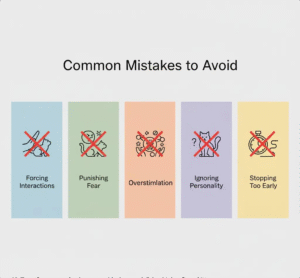
FAQs About Socializing Maine Coon Kittens
How long does it take to socialize a Maine Coon kitten?
It really depends on the kitten’s temperament and how early you start. Some Maine Coon kittens warm up within a week or two, while others might take a couple of months to fully relax around people, new sounds, and pets. The key is consistency a little positive interaction every day builds trust far faster than one big “training day.” Think marathon, not sprint.
Can an older Maine Coon still be socialized?
Yes, absolutely. While kittens are naturally more open to new experiences, older Maine Coons can still learn to trust and connect it just takes more patience. Start with quiet companionship: sit nearby, talk softly, and offer treats. Let them decide when they’re ready for touch or play. Even a shy adult can surprise you with how affectionate they become once they realize they’re safe.
Should I let my Maine Coon kitten go outside?
It’s tempting, especially because Maine Coons have that wild, adventurous streak but early on, it’s better to keep them indoors. You want them to bond deeply with your home first. Once they’re fully socialized, vaccinated, and microchipped, you can try short, supervised outdoor sessions with a harness or catio. Think of it like toddler-proofing their adventures safety before curiosity.
What should I do if my Maine Coon kitten is shy or scared?
Allow them to approach at their own pace. Reward small improvements, keep interactions short, and avoid forcing contact or sudden noise. Maine Coons are observant so, once they see that “strangers” don’t mean danger, their confidence grows. Eventually, many will stroll out proudly to say hello on their own terms.
What toys help with kitten socialization?
Interactive toys are your best friend here. Wand toys, feather teasers, and puzzle feeders not only burn off kitten energy but also help your Maine Coon connect play with positive human interaction. For shy kittens, a teaser toy can bridge the gap it lets them engage with you from a safe distance until they’re ready for closer contact.
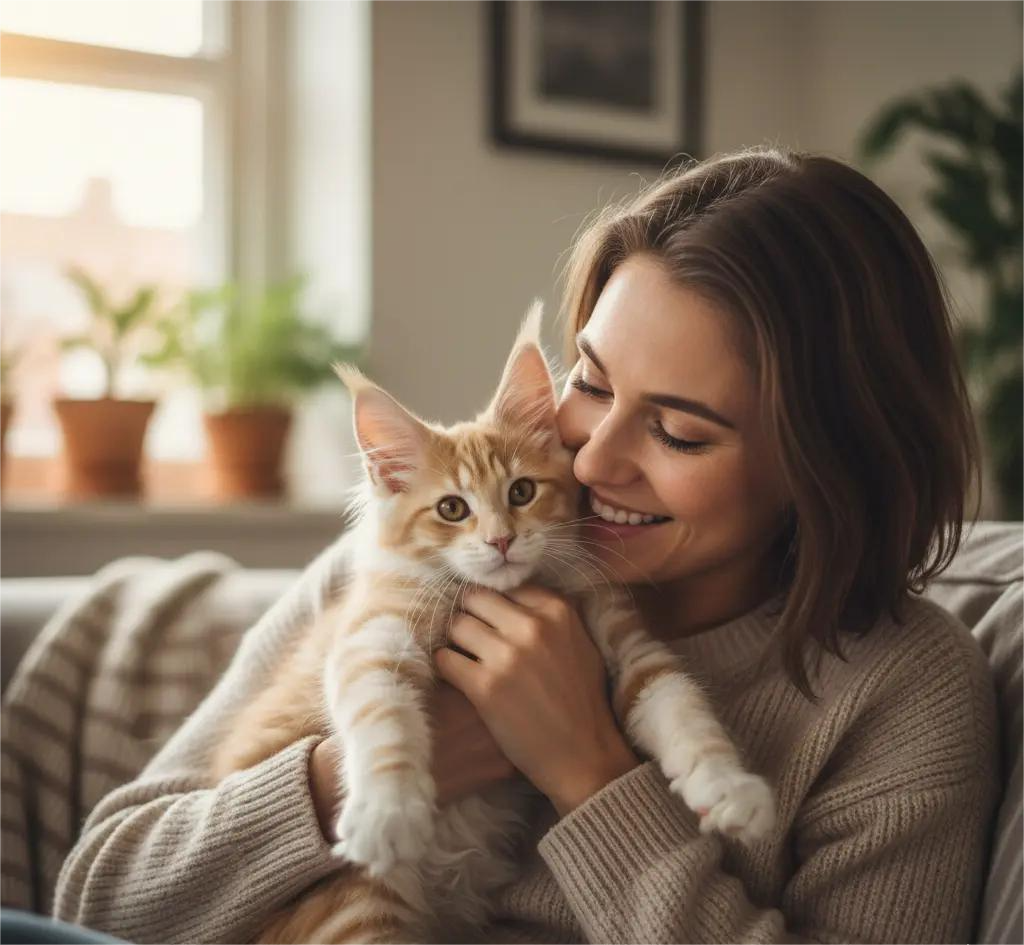
Hi, I’m Rob Archer. I’m deeply passionate about helping cats find loving homes and giving people the tools to make rescue and adoption easier. Every article I write is driven by a love for animals and a belief that every cat deserves responsible, long-term care. Learn more about Rob Archer.
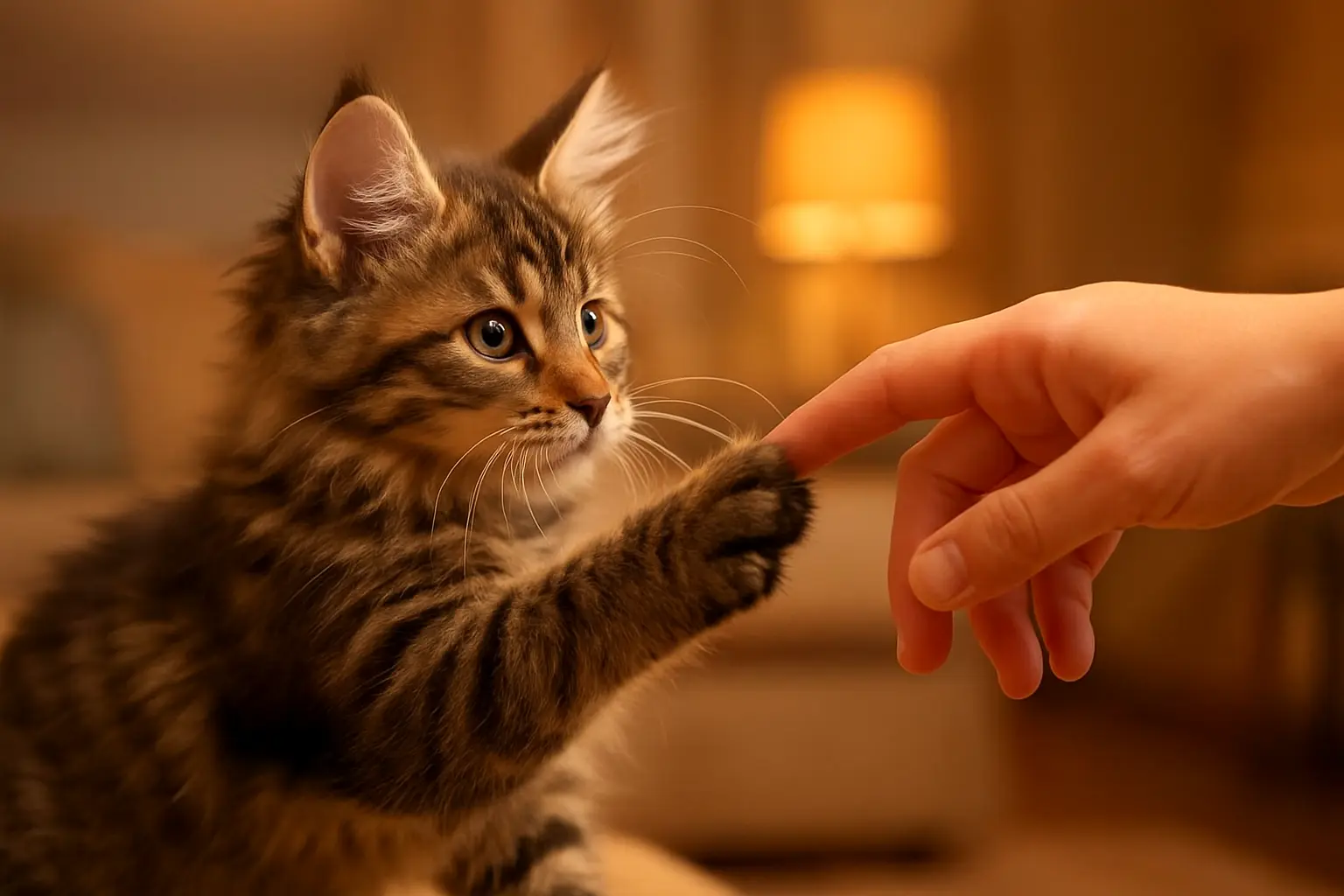
The diet guide here is one of the best I’ve found. I switched to a high-protein wet food like you recommended, and my cat’s coat looks so much healthier.
Your articles are always so easy to follow. I appreciate the way you explain each step without making it overwhelming for new cat owners.
This was such a warm and practical article. The tip about daily short play sessions to build trust really stood out. My kitten used to hide a lot, but this method is slowly helping him open up.
Thank you for explaining the socialization timeline so clearly. I was scared I was doing things too late, but your breakdown gave me a lot of confidence. could you help a guide for grooming Maine Coon kittens please, mine hates the brush and the nail trimmer.
This guide is super helpful. I didn’t realize how early Maine Coon kittens start forming habits. The part about introducing them gently to household sounds was something I never thought about but it makes complete sense.
I really loved the section where you talked about helping kittens feel safe during early socialization. It makes such a big difference later in their adult personality. I tried some of these steps with my own kitten, and it honestly works.